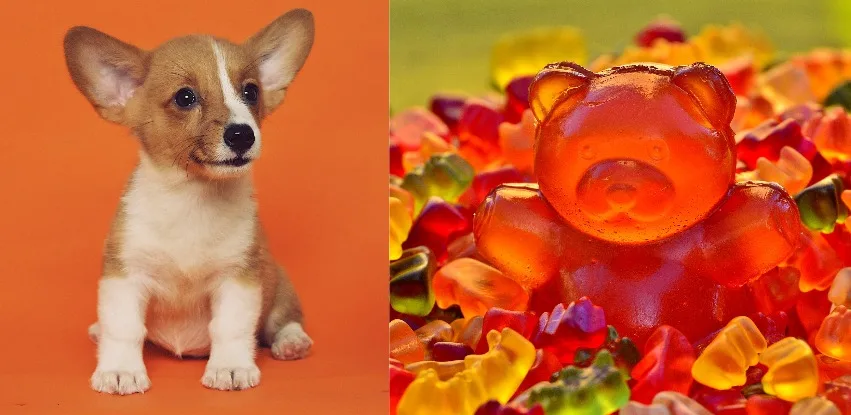Gummy bears are by far the most popular non-chocolate candy in the US. This means that gummy bears can basically be found in almost every household. Including households with pets, specifically dogs. This leads us to the question can dogs have gummy bears?
Is this delicious, fruity, sweet candy safe for dogs? Can dogs eat gummy bears?
In this article, we’re going to answer that exact question.
Before we start, we have other articles on different human snacks and candy and whether they are safe for dogs or not:
- Can dogs eat pretzels? What to know
- Cheesecake: Is it safe for dogs?
- Can dogs eat Skittles: Here’s the truth
- Can dogs eat Twizzlers or are they toxic?
- Goldfish crackers: Can dogs eat them?
- Can dogs eat jelly? Here’s your answer
- Can dogs eat caramel? Is it safe?
- Doritos: Are they safe for dogs?
Can dogs have gummy bears? – The truth
The answer to the question can dogs have gummy bears is a big fat NO. Your dog should definitely not eat gummy bears. And we are going to explain why.
Xylitol
The main reason why your dog shouldn’t eat any gummy bears (no, not even one!) is that, just like chocolate, they contain Xylitol.
Xylitol is often used in place of natural sweeteners and it’s extracted from corn fiber, birch trees, and other vegetable materials.. While it is completely safe for people, it is highly toxic for dogs.
This substance is so dangerous for dogs because it triggers an extremely high release of insulin from the pancreas. Consequently, this then causes a sudden drop in blood sugar or hypoglycemia. In the worst-case scenario, hypoglycemia can even be life-threatening for your dog.

Symptoms of Xylitol can appear within 15 to 30 minutes and they include:
- diarrhea
- black or tarry stool
- seizures
- trembling
- vomiting
- acute collapse
- walking as if drunk
- difficulty walking
- lethargy or weakness
- weakness
- tremors
- lack of coordination
Sugar
If the gummy bears of your choice do not contain Xylitol, then they probably contain sugar (which is not as dangerous, but still quite bad for your dog).
Sugar might not be as dangerous as Xylitol, but over time it can lead to serious health issues and problems. Diabetes, obesity, and tooth decay are just a few of them. According to PR Newswire since 2011, diabetes diagnoses in dogs have increased by 32%. This finding is pretty shocking, isn’t it?
Besides this, your dog’s digestion can suffer too because of sugar. This is because all the sugar (which your dog doesn’t need) upsets the balance of bacteria needed to digest food, which can lead to diarrhea and vomiting.
Additionally to all of that, too much sugar can cause inflammation in your dog’s body. The inflammation can then cause serious conditions like arthritis, dermatitis, and pancreatitis.
Conclusion
In conclusion, the answer to the question can dogs have gummy bears is no. The two main reasons is that they contain Xylitol and sugar, both are definitely not good for your dog.
Besides this, your dog should have a balanced and healthy diet. They should eat whole meals that will provide them with all the necessary nutrients. And truth be told, gummy bears are definitely not that!
So, please never give your dog any gummy bears. If you suspect that your dog stole one or two, make sure you look-out for the above-mentioned symptoms of Xylitol poisoning. Also, contact your veterinarian immediately.
If you want your dog to enjoy a nice, healthy treat, you can try giving them a few frozen blueberries or a couple of apple pieces! Both of these are safe and your dog will love them just as much as gummy bears.

